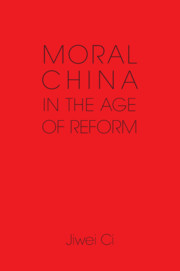Book contents
- Frontmatter
- Dedication
- Contents
- Acknowledgments
- Introduction
- 1 An Anatomy of the Moral Crisis
- 2 Political Order, Moral Disorder
- 3 Freedom as a Chinese Question
- 4 Freedom and Its Epistemological Conditions
- 5 Freedom and Identification
- 6 Neither Devotion Nor Introjection
- 7 The Insult of Poverty
- 8 Democracy as Unmistakable Reality and Uncertain Prospect
- 9 Freedom’s Unfinished Task
- 10 China’s Space of Moral Possibilities
- Index
- References
2 - Political Order, Moral Disorder
Published online by Cambridge University Press: 05 September 2014
- Frontmatter
- Dedication
- Contents
- Acknowledgments
- Introduction
- 1 An Anatomy of the Moral Crisis
- 2 Political Order, Moral Disorder
- 3 Freedom as a Chinese Question
- 4 Freedom and Its Epistemological Conditions
- 5 Freedom and Identification
- 6 Neither Devotion Nor Introjection
- 7 The Insult of Poverty
- 8 Democracy as Unmistakable Reality and Uncertain Prospect
- 9 Freedom’s Unfinished Task
- 10 China’s Space of Moral Possibilities
- Index
- References
Summary
1
Thirty years after China set off on the path of reform that has changed it beyond recognition in so many ways, what I have called the dialectic of the Chinese revolution is yet to run its full course. The contradictions that make up this dialectic – between the lingering idealism of a moribund socialism and the ascendant materialism of a brave new quasi-capitalist world – retain much of their potency, and in this sense China is still very much in the transition from Mao’s social order to a new one. We live amidst the ever renewed fallout of that transition, one of the most telling manifestations of which is a moral crisis with no end in sight. A phenomenon worth serious reflection in its own right, this moral crisis is also a point of entry into other problems, such as that of legitimacy, that have dogged China’s reform from its start to the present day. It is for its significance on both counts, and especially with a view to comprehending the relation between its moral and political dimensions, that I shall examine the moral crisis again in this chapter.
What is particularly striking about this moral crisis is that it has endured and even worsened alongside determined attempts by the party in power to maintain leadership and monopoly in the propagation of systems of belief and meaning. Despite the gradual relaxation of central control in the economic sphere and in many aspects of everyday life, the propagation of systems of belief and meaning, in morality no less than in politics, remains the prerogative of the state alone. It is one of the few crucial domains of life on which state political control is still strictly imposed.
- Type
- Chapter
- Information
- Moral China in the Age of Reform , pp. 24 - 36Publisher: Cambridge University PressPrint publication year: 2014

